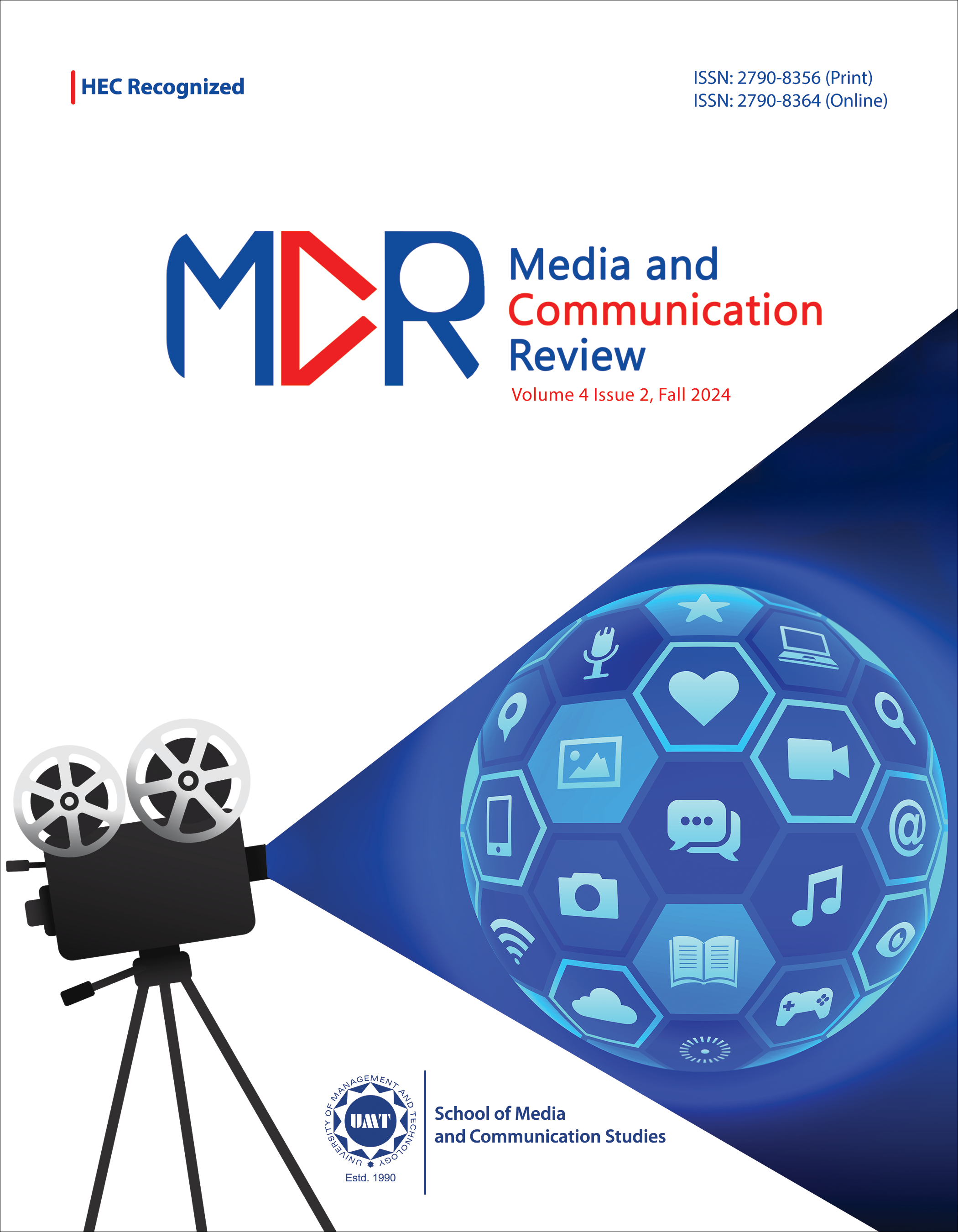Cyberbullying and its Impact on Mental Health among Female University Students in Sindh, Pakistan: A Case Study
Abstract
 Abstract Views: 0
Abstract Views: 0
This case study aimed to investigate the prevalence and impact of cyberbullying on the mental health of female university students in Sindh, Pakistan. The study used Social Dominance Theory (SDT) and Routine Activities Theory (RAT) to interpret the psychological consequences of cyberbullying, emphasizing the need for targeted interventions. The assessment of cyberbullying was conducted through a self-administered survey questionnaire comprising 20 items. The internal consistency of all items within the scale exhibited robust reliability (Cronbach's alpha = 0.859). A total of one hundred and eighty-two (182) female students actively participated in the research, engaging with the survey deployed on the Google Forms platform from April 12th, 2023, to September 27th, 2023. Of the participating individuals, 40.6% (74 respondents) indicated they had not encountered cyberbullying in recent months. In contrast, 59.34% (108 participants) reported experiencing cyberbullying incidents. The responses of the latter group were meticulously employed for the conclusive statistical analyses of this study. The outcomes significantly underscore an alarming escalation in the prevalence of cyberbullying within the female student population of Pakistan. Moreover, a noteworthy revelation emerged, wherein 47.2% of the respondents disclosed that they had opted for no action in response to the cyberbullying episodes they had encountered. In contrast, 17.6% acknowledged resorting to confiding in their parents after being subjected to online harassment. These outcomes emphasize the critical necessity for targeted interventions to mitigate the far-reaching implications of cyberbullying and its detrimental psychological repercussions on female students. The findings point to the pressing requirement for educational institutions and policymakers to address the rising tide of cyber victimization in Pakistan.
In contrast, 59.34% (108 participants) reported experiencing cyberbullying incidents. The responses of the latter group were meticulously employed for the conclusive statistical analyses of this study. The outcomes significantly underscore an alarming escalation in the prevalence of cyberbullying within the female student population of Pakistan. Moreover, a noteworthy revelation emerged, wherein 47.2% of the respondents disclosed that they had opted for no action in response to the cyberbullying episodes they had encountered. In contrast, 17.6% acknowledged resorting to confiding in their parents after being subjected to online harassment. These outcomes starkly emphasize the critical necessity for targeted interventions to mitigate the far-reaching implications of cyberbullying and its detrimental psychological repercussions on female students.
Downloads
References
Abbasi, S., Naseem, A., Shamim, A., & Qureshi, M. A. (2018, November 21–22). An empirical investigation of motives, nature and online sources of cyberbullying [Paper presentation]. Proceedings of 4th International Conference on Emerging Technologies. Islamabad, Pakistan.
Barlett, C. P., Simmers, M. M., Roth, B., & Gentile, D. (2021). Comparing cyberbullying prevalence and process before and during the COVID-19 pandemic. Journal of Social Psychology, 161(4), 408–418. https://doi.org/10.1080/00224545.2021.1918619
Bottino, S. M. B., Bottino, C. M. C., Regina, C. G., Correia, A. V. L., & Ribeiro, W. S. (2015). Cyberbullying and adolescent mental health: A systematic review. Cad Saude Publica, 31(3), 463–475. https://doi.org/10.1590/0102-311x00036114
Bozyiğit, A., Utku, S., & Nasibov, E. (2021). Cyberbullying detection: Utilizing social media features. Expert Systems with Applications, 179, Article e115001. https://doi.org/10.1016/j.eswa.2021.115001
Camacho, A., Runions, K., Ortega-Ruiz, R., & Romera, E. M. (2023). Bullying and cyberbullying perpetration and victimization: Prospective within-person associations. Journal of Youth and Adolescence, 52(2), 406–418. https://doi.org/10.1007/S10964-022-01704-3
Campbell, M. A. (2005). Cyber Bullying: An old problem in a New Guise? Australian Journal of Guidance and Counselling, 15(1), 68–76. https://doi.org/10.1375/AJGC.15.1.68
Craig, W. M. (1998). The relationship among Bullying, victimization, depression, anxiety, and aggression in elementary school children. Personality and Individual Differences, 24(1), 123–130. https://doi.org/10.1016/S0191-8869(97)00145-1
Dad, N., & Khan, S. (2017, January 7). Naila Rind killed herself because Pakistan's cybercrime laws failed her. Dawn. https://www.dawn.com/news/1306976
Doumas, D. M., & Midgett, A. (2023). Witnessing cyberbullying and suicidal ideation among middle school students. Psychology in the Schools, 60(4), 1149–1163. https://doi.org/10.1002/PITS.22823
Englander, E., Donnerstein, E., Kowalski, R., Lin, C. A., & Parti, K. (2017). Defining cyberbullying. Pediatrics, 140(Suppl 2), 148–151. https://doi.org/10.1542/peds.2016-1758u
Evangelio, C., Rodríguez-González, P., Fernández-Río, J., & Gonzalez-Villora, S. (2022). Cyberbullying in elementary and middle school students: A systematic review. Computers & Education, 176, Article e104356. https://doi.org/10.1016/j.compedu.2021.104356
Forero, R., McLellan, L., Rissel, C., & Bauman, A. (1999). Bullying behaviour and psychosocial health among school students in New South Wales, Australia: Cross-sectional survey. British Medical Journal, 319(7206), Article e344. https://doi.org/10.1136/BMJ.319.7206.344
Guo, Y., & Xia, L. X. (2023). Relational model of relative deprivation, revenge, and cyberbullying: A three‐time longitudinal study. Aggressive Behavior, 49(4), 333–344. https://doi.org/10.1002/AB.22079
Harris, S., & Petrie, G. (2002). A study of bullying in the middle school. NASSP Bulletin, 86(633), 42–53. https://doi.org/10.1177/019263650208663304
Hayashi, Y., & Tahmasbi, N. (2021). Psychological predictors of bystanders' intention to help cyberbullying victims among college students: An application of theory of planned behavior. Journal of Interpersonal Violence, 37(13–14), NP11333–NP11357. https://doi.org/10.1177/0886260521992158
Islam, G. (2014). Social dominance theory. Encyclopedia of Critical Psychology, 28(1), 1779–1781. https://doi.org/10.1007/978-1-4614-5583-7_288
Kaltiala-Heino, R., Rimpelä, M., Rantanen, P., & Rimpelä, A. (2000). Bullying at school indicates adolescents at risk for mental disorders. Journal of Adolescence, 23(6), 661–674. https://doi.org/10.1006/JADO.2000.0351
Leukfeldt, E. R., & Yar, M. (2016). Applying routine activity theory to cybercrime: A theoretical and empirical analysis. Deviant Behavior, 37(3), 263–280. https://doi.org/10.1080/01639625.2015.1012409
Lim, W., Lau, B. T., Islam, F. M. A. (2023). Cyberbullying awareness intervention in digital and non-digital environment for youth: Current knowledge. Education and Information Technologies, 28(6), 6869–6925. https://doi.org/10.1007/s10639-022-11472-z
Macaulay, P. J. R., Betts, L. R., Stiller, J., & Kellezi, B. (2022). Bystander responses to cyberbullying: The role of perceived severity, publicity, anonymity, type of cyberbullying, and victim response. Computers in Human Behavior, 131, Article e107238. https://doi.org/10.1016/J.CHB.2022.107238
Magsi, H., Agha, N., & Magsi, I. (2017). Understanding cyberbullying in Pakistani context: Causes and effects on young Female university students in Sindh Province. New Horizons, 11(1), 103–110.
Misra, R., Mahajan, R., & Srivastava, S. (2023). Cyberbullying perpetration during the Covid-19 pandemic: A study on the relationship between strain, anger and parental support. Behaviour & Information Technology, 43(2), 353–370. https://doi.org/10.1080/0144929X.2022.2163692
Musharraf, S., & Anis-ul-Haque, M. (2018). Impact of cyber aggression and cyber victimization on mental health and well-being of Pakistani young adults: The moderating role of gender. Journal of Aggression, Maltreatment & Trauma, 27(9), 942–958. https://doi.org/10.1080/10926771.2017.1422838
National Crime Prevention Council. (2023). Cyberbullying. https://www.ncpc.org/resources/cyberbullying/
Navarro, J. N., & Jasinski, J. L. (2011). Going cyber: Using routine activities theory to predict cyberbullying experiences. Sociological Spectrum, 32(1), 81–94. https://doi.org/10.1080/02732173.2012.628560
Olumide, A. O., Adams, P., & Amodu, O. K. (2016). Prevalence and correlates of the perpetration of cyberbullying among in-school adolescents in Oyo State, Nigeria. International Journal of Adolescent Medicine and Health, 28(2), 183–191. https://doi.org/10.1515/IJAMH-2015-0009
Rafi, M. S. (2020). Dialogic content analysis of misinformation about COVID-19 on social media in Pakistan. Linguistics and Literature Review, 6(2), 1–11. https://doi.org/10.32350/llr.62.12
Rajbhandari, J., & Rana, K. (2022). Cyberbullying on social media: An analysis of teachers' unheard voices and coping strategies in Nepal. International Journal of Bullying Prevention, 5(2), 95–107. https://doi.org/10.1007/S42380-022-00121-1
Shin, S., & Choi, Y. J. (2021). Comparison of cyberbullying before and after the COVID-19 pandemic in Korea. International Journal of Environmental Research and Public Health, 18(19), Article e10085. https://doi.org/10.3390/ijerph181910085
Stacey, E. (2009). Research into cyberbullying: Student perspectives on cyber safe learning environments. Informatics in Education-An International, 8(1), 115–130.
UNICEF. (2023). Cyberbullying: What is it and how to stop it: What teens want to know about cyberbullying. https://www.unicef.org/end-violence/how-to-stop-cyberbullying
Zhao, Y., Chu, X., & Rong, K. (2023). Cyberbullying experience and bystander behaviour in cyberbullying incidents: The serial mediating roles of perceived incident severity and empathy. Computers in Human Behavior, 138, Article e107484. https://doi.org/10.1016/J.CHB.2022.107484
Copyright (c) 2024 Mukhtar Ahmmad, Nasir Iqbal, Wafa Naz

This work is licensed under a Creative Commons Attribution 4.0 International License.




